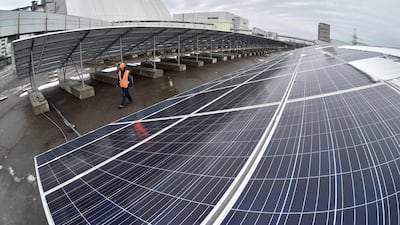Abu Dhabi is set to double the representation of Chinese firms at this year's Abu Dhabi Sustainability Week (ADSW), as the oil producer looks to meet the displacement of oil with cleaner sources of energy in some of its largest markets for fossil fuel.
Opening on January 13, Chinese representation at the sustainability week, which brings together world leaders, policymakers, thought leaders, decision makers, experts, scientists, business leaders and academics, is set to almost double with some of China's top renewables firms represented at the week-long exhibition.
Six companies in the top 10 exhibitors at the event are Chinese, said a spokesman for ADSW, adding that the number of Chinese exhibitors totalled 37, up from 21 last year. Trina Solar, JA Solar, JinkoSolar, Longi Lerri, Canadian Solar, Yingli Solar and Suntech are among the Chinese companies represented at ADSW.
"Around 10,000 business meetings are being set up," the spokesman added, declining to add the number visitors registered to attend this year's event.
Last year's ADSW saw 38,000 attendees and more than 600 companies from 30 countries represented.
There has been growing strategic energy-focused partnerships between the UAE and China. In 2015 the two countries signed a memorandum of understanding, which included collaboration on research and development of renewable energy sources, while the UAE’s Mubadala Investment Company teamed up with China Development Bank Capital and China’s State Administration of Foreign Exchange to create a US$10 billion investment fund, which included renewable energy in its purview.
____________
Read more:
More renewable projects in the pipeline for GCC countries in 2018
Why the GCC should adopt the petroyuan
____________
Since then JinkoSolar has become one of two key partners for the development of Abu Dhabi Water and Electricity Authority’s flagship 1.17 gigawatt solar power plant in Sweihan, known as Noor Abu Dhabi. In September Shanghai Power was one of two successful bidders selected to build a 700 megawatt extension to the Mohammed bin Rashid Al Maktoum Solar Complex for the Dubai Electricity and Water Authority.
“We have seen the strategic UAE-China relationship grow from one in which China was a modest purchaser of oil, to now, the two countries have decided to partner in investing across the One Belt One Road region,” said Afshin Molavi, a co-director of the Emerge85 Lab at the Johns Hopkins School of Advanced International Studies, speaking ahead of his appearance at ADSW. “It's quite significant because that's strategic investing," he added.
The World Future Energy Summit, which will feature ministerial sessions and executive level panel sessions, will begin on January 15 and run for the rest of ADSW.


